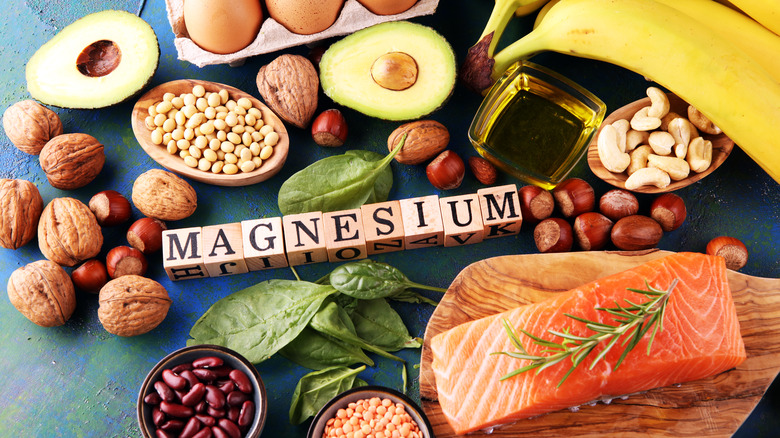How Magnesium Keeps Your Heart Rhythm Healthy
Magnesium is a nutrient that's vital to your body's well-being. It's essential for numerous bodily functions, but most importantly, that "Mg" on the periodic chart is a mineral that's crucial for good heart health. What effect does it have on the heart? Read on to find out more about magnesium and how it keeps your ticker in tip-top shape.
Not to be confused with manganese, magnesium levels are regulated in the kidneys, and excess comes out in your pee (via Everyday Health). Our body stores a tiny percentage in the blood, while greater levels are housed within bones, as well as within cells. It's a key part of a host of biochemical processes in the body, benefitting areas including the bones, nerves, and the muscles.
Speaking of muscles, one of our most important muscles, the heart, needs this nutrient every day. In order to prevent bigger heart health concerns, magnesium is crucial. A 2019 study published in Nutrients showed that adequate magnesium in the blood actually prevents mineral deposits in arteries. A Cardiology Research and Practice study from 2019 confirmed that a lack of magnesium increases the risks of heart disease and metabolic syndrome. Shockingly, half of the U.S. population likely needs more magnesium, as Oregon State University reports that nearly half of the U.S. may not be getting enough of it in their diet.
How does magnesium regulate our heartbeat?
The reason magnesium is so important to the heart is that it is essential for a healthy heartbeat. Everyday Health attests that magnesium gives electrolytes like potassium and calcium a lift into cells. Healthline points out that these elements trigger nerve and muscle responses that cause the heart to relax and contract at a normal rate. On the other hand, inadequate amounts of magnesium create an irregular heartbeat, medically known as an arrhythmia (per Everyday Health). The study from Cardiology Research and Practice mentions that low magnesium levels are associated with more serious arrhythmias like atrial fibrillation.
How much magnesium do you need? Daily recommendations from Healthline land at 400 mg for men aged 19–30; women of the same age group need about 310 mg. Those who are pregnant require a bit more, with intake suggested at around 360 mg. Eating a well-balanced diet decreases the chances of a deficiency. To add more magnesium-rich foods to your plate, Healthline experts suggest things like spinach, black beans, salmon, avocado, and chia seeds. Vegans and vegetarians can enjoy plant-based options like edamame and brown rice. However, Oregon State University notes you may need more "Mg" if you frequently experience nausea, muscle tremors, and extremely low potassium. If you think you're not getting enough, speak with a health professional about a diet change or supplements.


